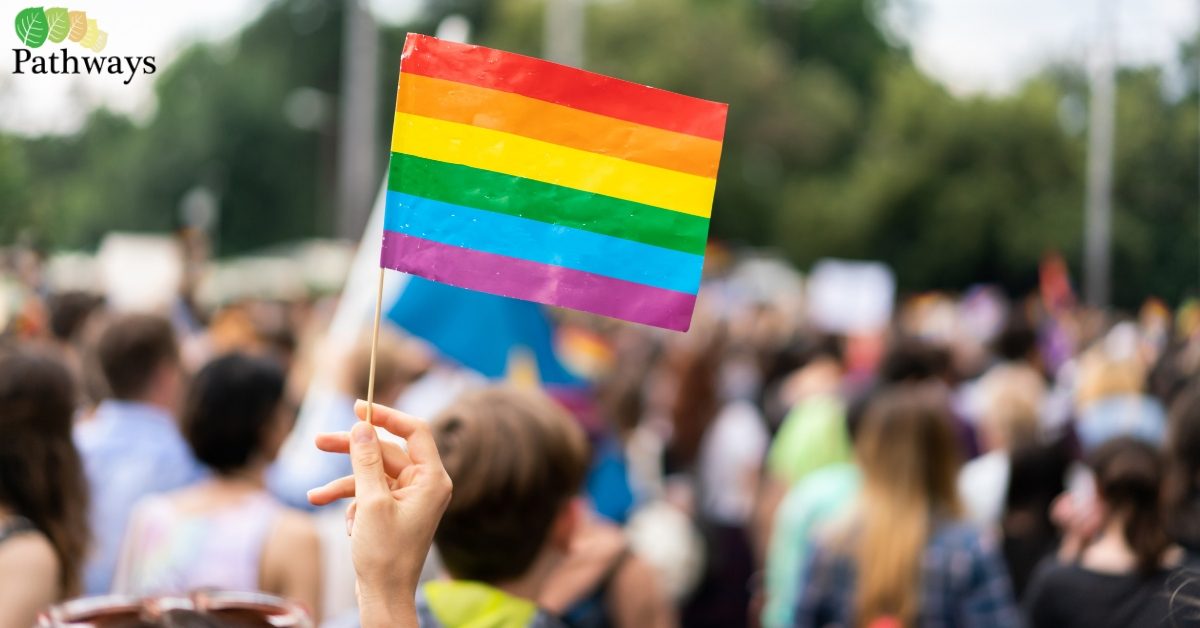Although mental health professionals considered homosexuality a mental illness between 1952 and 1973, today's professional standards recognize queer identity as healthy and normal. While gay, lesbian, bisexual, queer and trans identity individuals are finding increased mainstream support and acceptance, as many as 65% commonly face anti-LGBTQ harassment and discrimination.
The effects of discrimination contribute to an alarmingly high rate of substance abuse, depression, and suicide among LGBTQ individuals. A staggering 40% of those who identify as transgender has reported attempting suicide. But as shocking as these statistics are, the future is becoming less bleak every day. Emerging mental health resources for LGBTQ people are becoming more attainable thanks to the tireless work of LGBTQ activists and increasing support of allies.
Your active support is critical for the mental wellness of your LGBTQ loved one. Pathways Real Life Recovery Center in Utah understands that acceptance from loved ones and active family support play a particularly important role to prevent suicide. Be a part of the solution and lend your support by becoming an LGBTQ ally. Here are 5 ways to support the mental health of your LGBTQ loved ones:
1. Stand Up for Your Loved One!
Becoming a true ally can make a big difference in the daily life of your LGBTQ loved one. Life is challenging for all of us, but LGBTQ people often face anti-LGBTQ words and actions that create difficult barriers even in seemingly simple circumstances. As allies, it is our job to stand up for our LGBTQ loved ones by calling out anti-LGBTQ behavior.
Educate other family members about acceptance by explaining LGBTQ identities and openly answering questions. Show your support at work by having your LGBTQ co-worker's back and always call out discrimination. You can also make a difference by advocating for company or policy changes that will encourage acceptance and understanding like diversity training.
2. Respect Their Chosen Identity
Affirm the love and support for the LGBTQ people in your life by respecting how they choose to live their lives, who they choose to love and how they choose to be identified. Embrace their individual self-expression and stay away from pressuring them to conform.
Always use an individual's personally chosen gender pronouns and encourage or correct others to do the same. Research shows that the risk of suicide is reduced for transgender youth whose communities affirm their chosen identities.
3. NEVER 'Out' Your LGBTQ Loved One
Coming out isn't just revealing sexual orientation or gender identity. For most people, coming out is a long and difficult process. Each individual will face different life circumstances that greatly influence their coming out experience. Another person should never assume that they understand the contributing factors of such a challenging and life-changing moment.
While there is nothing shameful about being LGBTQ, openly expressing it - or not - is a highly personal choice. An individual has the right to facilitate their own terms about their identity and how open they wish to be, even if that differs greatly from one situation to the next. Make sure your LGBTQ loved one knows that you support their choices of expression and how they choose to share them.
4. Confront Your Own Biases
You love and support your LGBTQ family and friends. But whether you are aware of it or not, we all have involuntary implicit biases that can cause us to react in a discriminatory manner. This unconscious discrimination has deep-seated influences that no one is immune to like gender, religion, and class.
While it is okay to make mistakes, it is important to acknowledge and confront implicit biases in ourselves in order to better support our LGBTQ loved ones. Recognizing our own assumptions about gender, family, love, sex, and intimacy will help us confront biases that normally would never even surface.
Work on yourself to adjust the way you unconsciously think and feel to match your current level of love and understanding to be your LGBTQ loved one's best ally!
5. Support and Help Them Access Mental Health Resources
Support the mental health of your LGBTQ loved ones by being a good listener and making sure they know that you are there for them. You can help them find local resources for therapy and substance abuse treatment, an LGBTQ-friendly therapist and make sure they know about the LGBTQ National Help Center hotline, 1-888-843-4564 to instantly connect with someone who cares.
Contact the LGBTQ Mental Health Advocates at Pathways Real Life in Utah
If you're searching for an LGBQ counselor in Utah, our caring, qualified team of doctors, therapists and counselors are LGBTQ-friendly and will help you and your family work together to develop the skills needed for sustainable recovery. Reach a live therapist 24/7 at 801-895-3006 to schedule a FREE individual assessment. Pathways Real Life Recovery Center is located in Sandy, Utah. We accept most insurance.


